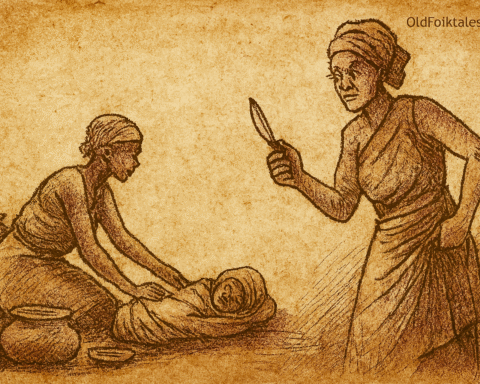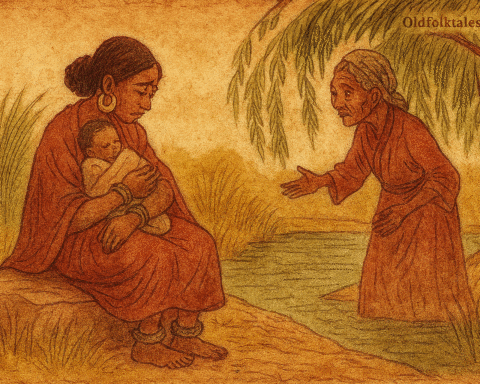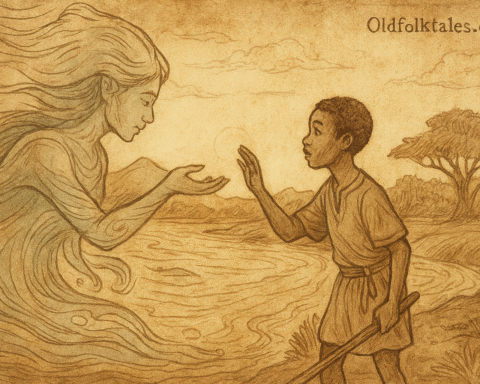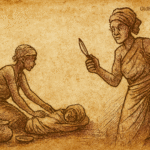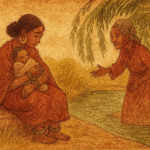In the old days, before the desert’s nights knew the glow of flame, all living things feared the darkness. The wind was cold enough to bite, the jackals’ cries tore through the night, and the shadows hid things that hunted without a sound. Fire existed then, but it did not belong to the people. It burned far away on the mountaintop, guarded by Ostrich, who claimed it as his own.
Ostrich was a tall, proud creature, with legs swift as the wind and feathers that caught the sun. But it was not his beauty or his speed that made him feared—it was the fire he alone possessed. The flames lived in a great clay pot inside his nest. He would warm himself by it when the nights grew cold, roast his food until it was tender, and sit in its glow while others shivered in the dark.
The animals came to him often, pleading, “Ostrich, share your fire so we may have warmth and light.” But Ostrich would only ruffle his feathers and laugh. “This fire is mine. I found it, I keep it. You may have none.”
The People Suffer
Among those who suffered most were the First People. Without fire, they ate raw roots and cold meat, their children’s teeth chattered in the winter wind, and sickness grew like thornbushes in the dry earth. The elders gathered under the starlight, whispering of what must be done.
Finally, they went to Jackal, the trickster, whose cunning was sharper than a thorn and quicker than a snake’s strike. “Jackal,” they said, “you are small, but your wit is great. Find a way to bring us fire from Ostrich, and we will honor you for all our days.”
Jackal grinned. “If Ostrich will not give the fire, I will make him give it.”
The Trick
The next morning, Jackal approached Ostrich with a friendly air. “Brother Ostrich,” he called, “you are the fastest runner in all the world, are you not?”
Ostrich puffed out his chest. “Of course! No creature can match my legs.”
“Then let us see it,” Jackal said slyly. “Race me to the end of the plain and back. If you win, I will give you a necklace of porcupine quills. But if I win… well, I will not win, so what matter is it?”
Ostrich laughed. “You challenge me? You will eat my dust before the halfway mark!”
But Jackal had planned well. He knew Ostrich’s pride was greater than his caution. “Let us make it fair,” Jackal said. “Leave your fire here, so it will not slow you. I will leave my necklace here as well.”
Ostrich agreed, setting his precious clay pot at the edge of his nest.
The Theft of the Fire
At the shout of “Go!” Ostrich sprinted away, his legs kicking up dust like a storm. Jackal, instead of running, grabbed a burning stick from the clay pot and darted in the opposite direction, heading toward the people’s camp.
When Ostrich returned, panting and certain of victory, his pot was there—but empty. Realization struck like a spear. He screeched in rage and chased after Jackal, his long legs eating the distance.
Jackal, hearing him close behind, darted into the thick thornbushes, weaving and twisting where Ostrich could not follow. Sparks flew from the burning stick, landing on dry grass. Soon, little flames were dancing in the wind. Jackal reached the camp, thrust the fire into the waiting hands of the people, and cried, “Tend it well, for it will keep you warm through the coldest night!”
The Punishment of Ostrich
Ostrich arrived too late, furious and panting. He tried to stomp out the flames, but the people drove him back with branches. In his rage, he stretched out his long neck to peck at the embers—and a child, quick as Jackal, struck him with a stick. Startled, Ostrich pulled his head back sharply, and from that day onward, he has never lifted his head high for long, always glancing around as though fearing another blow.
Some say this is why Ostrich keeps his head low and why he runs from men, remembering the day he lost the fire forever.
Moral of the Story
In the Bushman tradition, “The Ostrich and the Fire” reminds us that greed keeps blessings from the many, but cleverness in service of others can change the fate of all. Ostrich’s selfishness left him alone, while Jackal’s cunning brought warmth, safety, and hope to the people. A gift held too tightly will one day slip away, but what is shared becomes a legacy that lives on in every hearth and home.
Knowledge Check
1. What is the origin of “The Ostrich and the Fire” in African folklore?
This animal fable comes from the Bushman (San) people of Southern Africa, whose storytelling often explains the origins of animals’ traits and human customs.
2. Why did Ostrich refuse to share his fire?
Ostrich was greedy and proud, believing the fire was his alone because he had found it first.
3. How did Jackal trick Ostrich into leaving his fire unguarded?
Jackal challenged Ostrich to a race, convincing him to leave his fire behind so it wouldn’t slow him down.
4. What change happened to Ostrich after losing the fire?
Ostrich began keeping his head low and running from humans, a trait explained in Bushman lore as the result of his humiliation.
5. What lesson does “The Ostrich and the Fire” teach?
The story teaches that greed isolates the one who hoards, while generosity or clever action for the common good benefits all.
6. Why is this story considered an animal fable?
It uses talking animals with human traits to explain natural characteristics and teach moral lessons, fitting the tradition of African animal fables.

